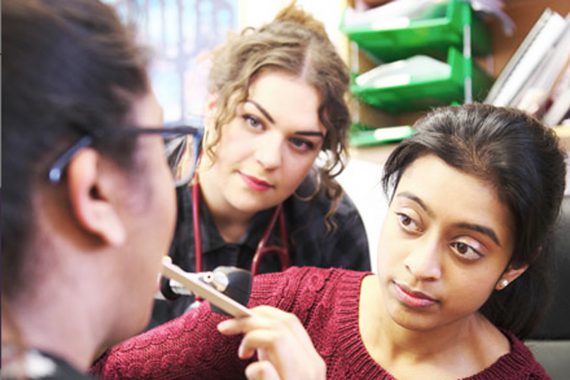Exclusive GP leaders are in talks about how to bring back UK nationals studying medicine in Bulgaria back, as they claim this would be a ‘much cheaper’ alternative to the Government’s plan to recruit full trained doctors abroad.
The North East London sustainability and transformation partnership has written to Health Education England asking for backing to recruit UK nationals from Plovdiv University in Bulgaria straight into FY2 posts.
It comes as the NHS is looking to recruit more than 2,000 GPs from abroad to reach the Government’s target of 5,000 extra GPs by 2020.
The Government promised 1,500 medical training places last year, also proposing that the extra places would go to medical schools that aim to boost GP trainee numbers by exposing students to general practice.
Dr Anwar Khan, chair and clinical director of NHS Waltham Forest CCG, told Pulse that on a recent visit to the university in Bulgaria on behalf of the partnership, he spoke with 69 medical students in their final year, all of whom are UK nationals interested in returning to the UK.
Dr Khan said: ‘Given we’ve got a shortage of doctors, whether it’s primary or secondary care, given we have these doctors trained for free from a tax-payer’s perspective and, more importantly, given that Jeremy Hunt has talked about 1,500 new medical places that will need 1,500 foundation posts in five years time: Can we not bring that forward and bring our Brits back to our country?’
HEE has struggled to hit its target of recruiting 3,250 GP trainees per year, with figures from July showing that 18% of training places in England went unfilled after two rounds of recruitment.
However, health secretary Jeremy Hunt told the RCGP annual conference in October that 41 more medical school graduates are going into general pracitce than this time last year, adding that they had 518 more to recruit before hitting the 3,250 target.
Dr Khan added that he was ‘amazed’ at the students’ enthusiasm to return to the UK, with 24 of the trainees saying they would like to become GPs.
But he said some were deterred by a lack of information on how to apply to FY2 posts, and medical students in Bulgaria graduate in December but UK FY2 positions don’t start until August.
Dr Khan said: ‘In the old days they used to have a February and August start dates. Once thing I’m suggesting that HEE might want to consider is actually have an intake twice a year. There seems to be a lack of information on how to apply to posts.’
Since returning, Dr Khan has ‘twinned’ medical students at Queen Mary University London with those in Bulgaria who are looking to return in an attemot to help them ‘understand the system of how to apply’ to FY2 posts in the UK.
He added that bringing British trainees back is a ‘much cheaper’ alternative to the international recruitment scheme, which uses recruitment agencies.
He said: ‘Given we’re spending £100m on international recruitment, depriving other countries of their doctors, it’s also morally right that we have our own people coming back because then we don’t have to relocate, bring families in and I think all they need is a bit of love, and a bit of a career path.’
A spokesperson for HEE told Pulse that they have responded to Dr Khan’s letter ‘including on the issue of graduates from Eastern Europe and the recruitment processes that support appropriate applicants’. They added that HEE has ‘also offered to meet with Dr Khan and his colleagues’.
NHS’s targeting of international doctors
Much of the Government’s efforts to deliver 5,000 more GPs by 2020 have focused on recruiting foreign GPs that have trained abroad.
In July, NHS England announced it would be increasing the number of GPs recruited from overseas from 500 to around 2,000 in a bid to help achieve the goal.
Pulse revealed in August that GP practices will be able to recruit 600 more fully qualified overseas GPs by April 2018 and 1,000 by December.
A contract notice for the recruitment scheme, worth £100m, admitted that immigration is likely to provide the lion’s share of the promised GP workforce expansion.
But Pulse has reported that HEE and the GMC are also persuading the 4,000 current international medical graduates who register to practise in the UK each year to consider applying for GP training using promotional material.

















